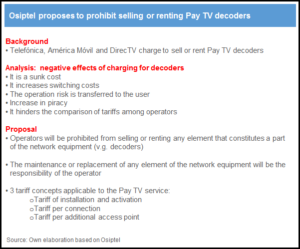Osiptel has published the Draft of the Tariff System of the Pay TV Service, in order to prohibit the collection for the concept of rental and sale of decoders.

The Draft
The norm defines 3 tariff concepts applicable to the Pay TV service:
- Tariff of installation and activation: one-time tariff that is applied when contracting the service (it can be paid for a maximum period of 6 months)
- Tariff per connection: periodic tariff (for the postpaid modality) or non-periodic tariff (for the prepaid modality) that is applied to keep the service active, and includes, at least, the authorization of one (1) access point
- Tariff per additional access point: a tariff that is applied for the authorization of each additional access point
Operators will be prohibited from selling or renting any element that constitutes a part of the network equipment.
It should be noted that the norm defines the network equipment as any element indispensable for the provision of Pay TV service in all the access points (televisión sets or other related devices), such as: antennas, cables, activation cards, SIM cards, consoles, decoders or any other device that serves a similar purpose.
The maintenance or replacement of any element of the network equipment will be the responsibility of the operator.
Analysis
In May of this year, Osiptel announced that it had been analyzing the implications of the fact that some operators charged for the rental and sale of decoders.
In its analysis, Osiptel argues that the decoder is part of the stage of transmission, coding and decoding of Pay TV signals, functions that are beyond those performed by a terminal equipment (e.g. televisión sets) and that, on the contrary, they would be functions of the operator´s network elements.
Additionally, in Peru, the existence of a secondary market for decoders has not been observed, because the different technical characteristics would not allow the interoperability of the decoders of the different operators. Therefore, in the current scenario, the decoders marketed by the operators (Telefónica, América Móvil and DirecTV) are only compatible in their own networks.
According to Osiptel, the sale or rental of decoders causes the following negative effects:
- It is a sunk cost: a decoder has no re-use value
- It increases switching costs: a user must acquire new decoders if he wants to switch operators
- The operation risk is transferred to the user: once the warranty period has expired, the user must take responsibility of the possible repair costs
- Increase in piracy: users who switch operators could sell their decoders to users who could alter them in order to illegally access the contents provided by the provider operator of the decoder
- It hinders the comparison of tariffs among operators: operators advertise mainly the monthly service tariff, which does not necessarily reflect the total tariff that the user ends up paying
Therefore, the objective of the Osiptel proposal is to correct these undue commercial practices (sales or rental of decoders), in order to improve the competitive dynamics and thus, the welfare of the users.
Osiptel argues that the proposal is consistent with the practice developed by operators at the international level (Argentina, Brazil, Chile, Colombia), which deliver at least one (1) decoder equipment as a loan at the moment of contracting the service.
This post is also available in: Spanish



Leave a reply